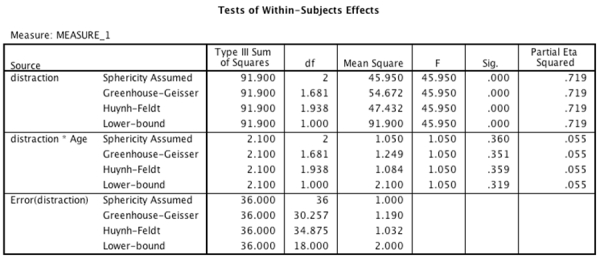An experiment was done to compare the effect of having a conversation via a hands-free mobile phone,having a conversation with an in-car passenger,and no distraction (baseline) on driving accuracy.Twenty participants from two different age groups (18-25 years and 26-40 years) took part.All participants in both age groups took part in all three conditions of the experiment (in counterbalanced order) ,and their driving accuracy was measured by a layperson who remained unaware of the experimental hypothesis. Which of the following sentences is the correct interpretation of the main effect of distraction? 

Definitions:
Operant Conditioning
The mechanism of altering the intensity of a behavior by the strategic use of endorsements or reprimands.
Cognitive Learning
A style of learning that focuses on understanding, reasoning, problem-solving, and applying information rather than just memorizing facts.
Intelligence
The capacity for learning, reasoning, understanding, and similar forms of mental activity; aptitude in grasping truths, relationships, facts, meanings, etc.
Unconditioned Response
An automatic, innate reaction to a stimulus that occurs naturally without any prior learning or conditioning.
Q3: Which of the following is a means
Q4: Six patients are referred to a specialist
Q10: A researcher measured a group of people's
Q11: Which of the following transformations is most
Q13: A researcher working in a Human Resources
Q14: Which of the following statements about the
Q19: How are the degrees of freedom
Q19: Based on the following output,which item on
Q20: Unlike multiple regression,logistic regression:<br>A)Does not have b
Q20: The calculation for the sum of squares